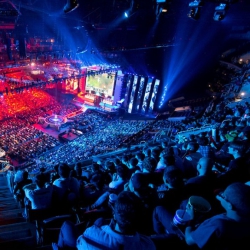Professional poker player Eugene Katchalov announced he is switching focus to eSports events. Esports involves competitive video game contests for real prize money.
Eugene Katchalov will not be a competitor in the burgeoning eSports circuit, at least not directly. Instead, he is the co-owner and manager of QLASH, his own eSports team.
In 2017, Katchalov and another former pro cardplayer, Luca Pagano, launched QLASH (pronounced “Clash”). Starting in May 2018, Katchalov announced on LinkedIn he would retire from the pro poker cirtuit to devote himself full-time to eSports management.
The eSports circuit is growing in popularity. Last year, the combined circuits for games like League of Legends, Dota2, CS:GO, and Overwatch offered $93 million in prize money to pro eSports competitors. Esports betting is now legal in Nevada, along with many countries around the globe, including the United Kingdom.
Fortnite eSports Circuit
In fact, eSports is about to become twice as lucrative. Katchalov’s announcement came just weeks before Epic Games announced it would spend $100 million to launch a pro Fortnite circuit. Overnight, Fortnite eSports tournaments became the premier league for electronic sports gaming.
That presents a massive opportunity for eSports startups like QLASH which were late to the party. For years, top eSports franchises like Team Liquid, Newbee, and Virtus.pro have been building teams for the League of Legends or Counter-Strike circuits.
Now, there will be a mad scramble to find the best Fortnite players in the world. With everyone starting from scratch, Eugene Katchalov and Luca Pagano have a chance to compete — if they know the right players and can throw enough money at them. That requires full-time attention to the Fortnite community — and a full-court press on potential investors.
Poker vs. ESports
Eugene Katchalov, who won a WSOP bracelet for winning the $1,500 Seven-Card Stud at the 2011 World Series of Poker, said pro poker and pro eSports have a lot in common. Katchalov recently gave an interview in which he opened up about his decline in poker, and how his struggles to match the 2011 success led him to eSports.
Katchalov said in the interview, “While I always enjoyed all sorts of competitive games, my first real experience observing an eSports competition was in Seoul, Korea in 2012 when my good friend Elky took me to a Starcraft event. I was overtaken with the amount of energy in the room.”
Speaking of the excitement in the South Korean eSports crowd, Katchelov said, “In many ways it seemed there was more of it than in any other normal sporting events I’ve been to before this.”
Katchalov added, “I was hooked. I started to follow lots of teams, players and streamers playing multiple different games. I began to notice that many of these kids were going through many of the same stages I went through in poker. While I was certainly too old to compete myself, I really enjoyed following the scene.”
Esports Events Compared to Sports Broadcasts
Those unfamiliar with the eSports scene should understand that events attract rabid fan support, both in live venues and Twitch broadcasts. Esports broadcasts have the same format that sports broadcasts do. There’s a play-by-play analyst and a color commentator, along with a full studio crew which analyzes tactics and the big picture alike.
Esports competitors are colorful personalities with their own fan support. Teams gain fan followings, who read articles about their training methods and their lives outside the game. They follow recaps on Twitch and YouTube, which have channels that are successful in their own right.
Who Owns eSports Franchises?
Esports ownership and management is becoming a pet project for investors from many fields. One traditional sports owner claims he dismissed eSports when first approached to invest in a team.
Before he dismissed it completely, he asked his teenage son about eSports. His son said, “When you were young, you watched baseball on tv and played baseball with your friends. With my generation, we watch eSports on Twitch and play video games online with our friends.”
That perspective convinced the traditional sports owner to invest in his own eSports franchise. Whether one is a MLB owner or a retired poker player, eSports will be a challenge to master. The eSports circuits, like anything involving fame and money, are going to be highly competitive.
QLASH eSports Team
Eugene Katchalov seems to have a passion for the game. He described the past year in the business with QLASH, saying, “We’ve evolved and grown leaps and bounds. Having over 30 players under contract and 25 employees means this is a very full time job for us. While we often have our internal problems to solve just as any other startup, overall the experience is extremely rewarding. Our ideas, goals and general approach is for the very long term. It’s really exciting that after each working day you feel like you’ve added to something big in a small way.”
For those who love Fortnite Battle Royale and think they have the chops to compete, you might read what Katchalov has to say about the mindset of an eSports competitor. He describe the scene: “I see many similarities in the kids trying to go pro in Esports as I went through in Poker. The rollercoaster of emotions and constant psychological uncertainty in your own abilities is not unique to poker.”
“Besides knowing how to play the game well, it’s also very important to lead a healthy physical and mental lifestyle outside of the game. All these things are +EV in the end. Now I feel it’s my turn to take my experience and knowledge and pass it on to them in hopefully a productive and positive manner.”

